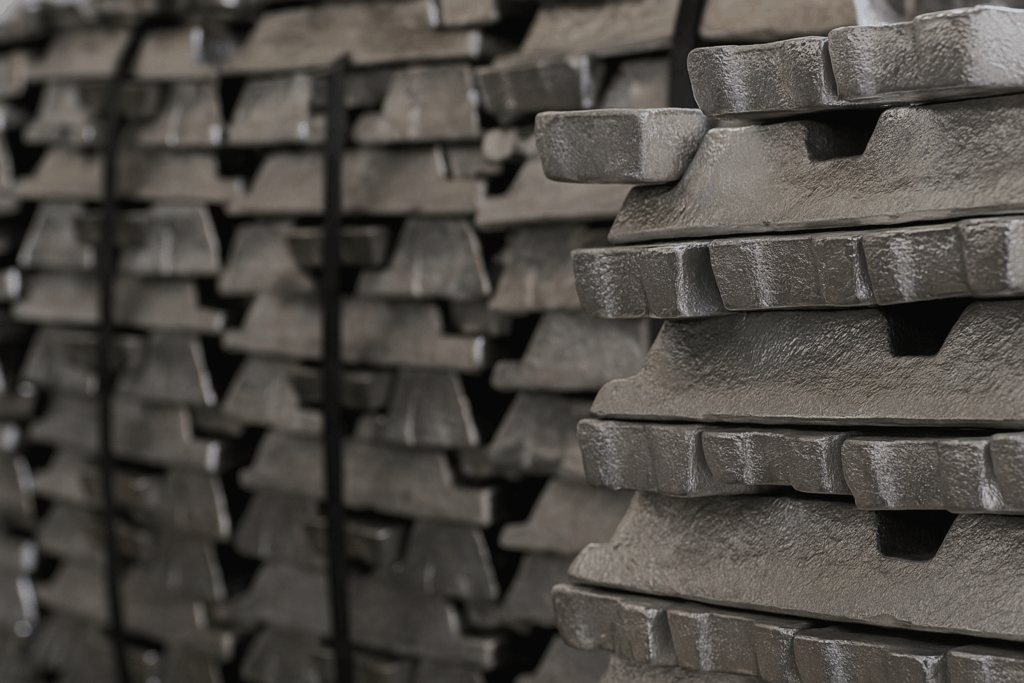About of Aluminum Ingots
Aluminum ingot is one of the most widely used intermediate products in the metal industry. It is melted or rolled to produce various aluminum profiles. Thanks to aluminum’s unique characteristics—such as its high strength-to-weight ratio and chemical neutrality—it serves as a key raw material in casting industries for producing sheets, pipes, rods, and other aluminum-based products.
What Is an Aluminum Ingot?
An aluminum ingot is a non-ferrous product made by pouring molten aluminum into specially designed molds. These molds come in various shapes and sizes, resulting in different types of ingots.
Today, aluminum is the second most used metal in the world after iron, due to its versatility and value across multiple industries. Its extensive applications have driven global demand for high-quality aluminum extraction and processing.
Applications of Aluminum Ingots
Aluminum ingots are used across a broad range of industries, including:
Construction – for building frames, panels, and architectural components.
Transportation – for manufacturing vehicle bodies and structural components due to its lightweight strength.
Packaging – converted into foils and containers for food and beverages.
Electrical and Automotive Industries – used in producing cables, electrical appliances, and auto parts.
For example, in packaging, aluminum ingots are processed into thin foils used in food-grade containers, while in automotive applications, they are shaped and forged into durable mechanical components.
Because aluminum is both lightweight and strong, it is highly valued in land, sea, and air transportation manufacturing.
Aluminum Ingot Production Process
The production of aluminum ingots involves five main stages from mine to factory:
Extraction of aluminum ore
Melting the aluminum in industrial furnaces
Transferring molten aluminum to casting units
Pouring the molten metal into molds
Cooling and removing the solidified ingots

Advantages of Aluminum Ingots
Aluminum offers multiple advantages that make it an ideal substitute for other metals such as steel and iron:
High Strength-to-Weight Ratio: Although lighter than iron or steel, aluminum provides impressive strength and durability.
Excellent Electrical Conductivity: Its lightweight nature enhances electrical conductivity, making it suitable for power and electrical components.
Superior Thermal Conductivity: Aluminum transfers heat efficiently, ideal for heat exchangers and thermal systems.
Corrosion Resistance: Aluminum ingots exhibit high resistance to corrosion, providing longevity even in harsh environments.
High Malleability and Formability: This allows the production of a wide range of products such as aluminum sheets, profiles, and rods.
Types of Aluminum Ingots
50-Pound Aluminum Ingot
These ingots are a combination of aluminum with other metals such as copper or magnesium. They are commonly used in casting and automotive manufacturing.
1000-Pound Aluminum Ingot
Made from pure aluminum, these ingots are ideal for applications in packaging, hygiene products, and alloy manufacturing industries.
Aluminum Slab
Produced through the casting of aluminum ingots, slabs have a smooth, rectangular surface and are mainly used in rolling and extrusion industries.
T-Bar Aluminum Ingot
T-Bar ingots are made of pure aluminum and have excellent electrical conductivity, making them suitable for cable and home appliance production.
Aluminum Billet
Billets are cylindrical aluminum ingots widely used in the extrusion process to produce aluminum profiles and structural components.
[Link: Metal Products]
